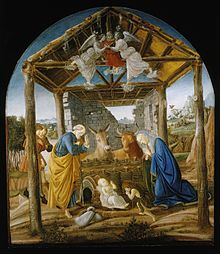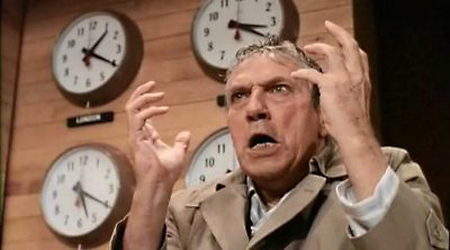 |
| "Circumcision of Christ" by Albrecht Durer |
So what’s in a name? I really like my name—Owen.
It’s a sign of my Welsh identity. I guess my dad wanted to preserve his ethnic
heritage in me and gave me a specifically Welsh name. “Owen” means “Young
Warrior.” Although I’ve never been a warrior and can no longer officially
qualify as “young,” I’m proud of it all the same. I share it with a legendary
Welsh rebel hero Owen Glendower (immortalized as a character in Shakespeare’s Henry IV Part 1) and with the mythical Welsh hero Sir Owen, Knight of the Round
Table. When my father hung this moniker on me it was the 404th most
popular boy’s name in the U.S. At the time, I was the only Owen I knew. Today,
however, the name has risen in popularity even among the non-Welsh and is the
21st most popular boy’s name in the U.S.
In the U.K. they’d say that Owen is my Christian name. That title for what we
Yanks call a first or given name comes from the tradition of
officially naming a child at baptism or christening.
(BTW, here in Philadelphia, the term “christening”
is often used synonymously with baptism. Technically, the two are not the same.
Baptism is the sacrament of washing with water which officially makes one a
Christian. Christening is the anointing with oil which is often done at baptism
but is not, strictly speaking, a necessary part of the sacrament. I just
thought you should know that!).
I suspect that the high infant mortality
rate throughout much of human history is what prompted the postponement of
naming until a child was officially introduced to the community. You wouldn’t
want to bring a newborn (with a brand new immune system) out into the world
until he or she had at least a week to get used to being born. In the world of
our gospel text for this feast (Luke 2:15-21), a week had to elapse to make
sure the child was strong enough to survive before parents would risk embracing
the child’s identity. A baby like Jesus would be nameless until the eighth day
when his vitality seemed a little more certain and he could be ritually
received as a child of Abraham. So, too, we Christians used to wait until
baptism before conferring a name on a child. This also explains our Western
calendar. Jesus’ birthday might be celebrated on December 25th, but
the Year of Our Lord couldn’t begin until the child had a name and an identity.
And what is that identity? Our Lord’s name
is a contraction of a Hebrew name roughly transliterated as Yehoshu’a, which is
usually translated to mean “Yahweh Saves,” or “Yahweh Delivers,” or “Yahweh
Rescues.” It’s a variation on the name which we pronounce “Joshua,” too.
So what’s in a name? What does the name of Jesus mean to you? I
know I have so often used this sacred name in vain, and for lots of Americans
it might be nothing more than a swear word. But what can speaking those sacred syllables
do for us? We’re told that prayers are answered if prayed in the name of Jesus. So what is it about that
name?
I think it might be a good idea for us to
contemplate the name of Jesus from time to time. If Jesus’ identity is linked
to his name—which scripture tells us it is (See Matthew 1:21)—how does that
identity speak to you? Jesus is our Savior, but from what or for what are we
saved or rescued? Traditional Church orthodoxy says that we are rescued by
Christ’s atoning sacrifice on the cross from taking our own eternal punishment
after death. Okay. That’s cool, but what does it mean for you now?
It’s really a bizarre thought to look at the
figure of a man being tortured to death by being impaled on a cross of wood and
associating that horrific image with being rescued. But that very image carries
with it some powerful truths which my heart needs to embrace. The first is that
suffering is real and unavoidable, and to speak the name of Jesus is to be
reminded of one who suffers. Perhaps that is to move me to compassion and the
knowledge of shared humanity. But then, speaking that name reminds me of God’s
love in embracing our human suffering, participating in it, and enduring it
without complaint or bitterness. Then the name of Jesus reminds me that
suffering and death were not final. That name which his enemies hoped would die
with him on the cross became, within a single generation, the name above all
names. The crucified criminal’s name became the prayer on the lips of the Roman
world.
When we say the name of Jesus we say that
God rescues us. We are rescued from insular selfishness, from abandonment and
worthlessness, and from the great evils of complacency and despair. How
beautiful is the name of Jesus when we say it in faith and confidence!
Thanks for reading, my friends. May you
all have a blessed, safe, and happy 2017 in the name of Jesus!






